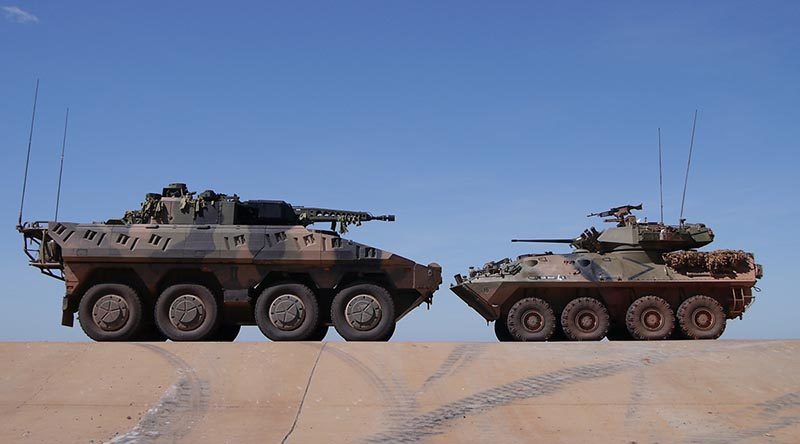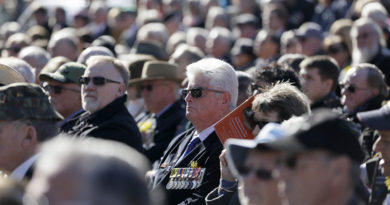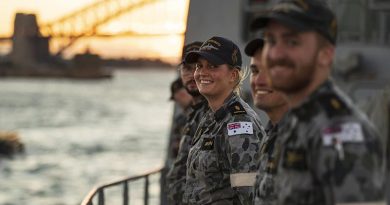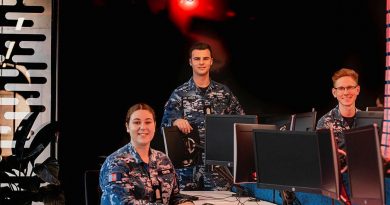Boxer CRV contract officially signed

The contract to deliver 211 Boxer CRV armoured combat reconnaissance vehicles to the Australian Army was formally signed on Friday.
FILE PHOTO: Rheinmetall’s Boxer CRV overshadows the current in-service ASLAV for more than just size. ADF photo.
The government officially signed the contract with Rheinmetall for 211 armoured combat reconnaissance vehicles, which will provide vital mobility, lethality and protection for Australian soldiers.
Prime Minister Malcolm Turnbull said Boxer CRV would ensure Australian soldiers have the best possible chance of completing their missions successfully and returning home safe to their families.
Rheinmetall Boxer will replace the current fleet of ASLAVs (Australian Light Armoured Vehicle), which are now more than 20 years old.
Fitted with modern sensors and communications equipment, Boxer’s role is to locate, monitor and engage with enemy forces and provide security to our forces.
The vehicles will fill seven different roles on the battlefield including reconnaissance, command and control, joint fires, surveillance, ambulance, battlefield repair and recovery.
Total acquisition cost of the vehicles is $5.2 billion.
Mr Turnbull said Australian-industry content of the project was raised significantly through the tender process to more than 50 per cent, and more than 75% for sustainment of the vehicles.
“Boxer will be built by Australian workers, using Australian steel, creating up to 1450 high-tech, highly skilled jobs across Australia,” Mr Turnbull said.
“This nation-building project highlights the benefits to our servicemen and women, Australian industry and workers stemming from the Turnbull Government’s commitment to developing and supporting Australia’s defence industry while investing in our military capability.
“The workforce that will deliver the Boxer vehicles will continue to be used to support sustainment, progressive development and upgrades as well as potential export opportunities.
“With the contract now signed, the largest acquisition project in the history of the Australian Army can progress with the first vehicles expected to be available for training in 2020.”
.
.
.
.
.
.

.
.






Brian, a question about costs …211 CRV for “Total acquisition cost of the vehicles is $5.2 billion”. I assume the 5200 million dollars includes capital equipment for maintenance facilities, internal electronics, ordnance etc.
That is still $24.6 million dollars per single vehicle which just sounds too much money.
Or is $24.6 million the expected lifetime cost over an operational life of “x” years.
….just wondering if $24.6 m is too expensive ….Regards Raymond
Hi Raymond. I’m as confused about costs as you are. That said, it will certainly include more than just the vehicles. It will also include literally shed-loads of spare parts, including engines and gearboxes. It usually also includes such things as new yards to park them in, new workshops and tools to maintain them. And probably also simulators and other training aids. There’s a lot that goes into an overall price – but Defence never itemises it for us. I think, in this regard, they do themselves a disservice, because, ultimately, the taxpayer is left wondering why individual vehicles cost $24.6 million each – which is a negative thought that could be avoided with a little more openness and honesty in relation to how they are spending OUR money.
A classic example of all the confusion over project prices is the story “https://www.contactairlandandsea.com/2018/06/26/australia-formally-commits-to-triton/” – and despite asking Defence for a breakdown (and being assured three times that an answer will be forthcoming), I’m still waiting for their answer since 2 July!!!